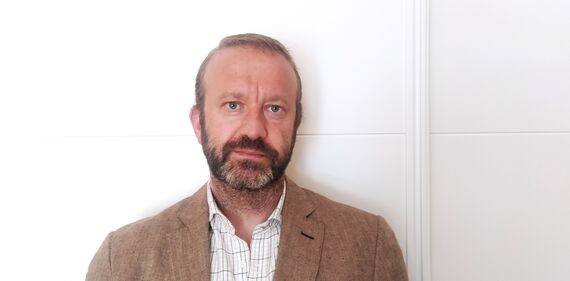
In Conversation with Juan Luis Manfredi
Prof. Juan Luis Manfredi is the Prince of Asturias Distinguished Visiting Professor at the School of Foreign Service. He is a tenured Associate Professor at the University of Castilla-La Mancha, where he teaches Journalism and International Relations. He writes on public diplomacy and propaganda, international relations and diplomacy, communication and technology, as well as political risk and the liberal order. In this interview, GGCI Faculty Director Uwe Brandes and Professor Juan Luis Manfredi explore cities and diplomacy.
Uwe Brandes (UB): Welcome to Georgetown! As a scholar of diplomacy, how did you arrive at your interest in cities?
Juan Luis Manfredi (JLM): After working as a journalist for many years, about 15 years ago I switched to academia and started researching media policies, international relations, political communications and leadership. My main area of interest has been public diplomacy; i.e. how country leaders -- but now also city mayors -- are trying to impact public opinion. There is a growing demand in analyzing and understanding soft power or hybrid power especially for those of us interested in contemporary practice. Communication practices are having an impact on policies and on the way we evaluate them.
I’ve been asking myself, who is doing public diplomacy? Who is trying to use power? Is it traditional power or new forms of soft power? This is how I came to cities. Cities are trying to impact global governance through public diplomacy. Cities are increasing the visibility of their mayors. Cities need to attract international investment and increase employment. For example, Berlin is a star in entrepreneurship in Europe, probably because of a variety of different attributes -- including intangible ones -- that make it an attractive place for entrepreneurs.
Other topics within public diplomacy, such as climate change, migration, mobility, and more, all have a city angle to them. Cities realize, “Okay, I need a plan for that and, probably I can copy or learn from other plans coming from other cities.” It is more probable that cities like Barcelona, Madrid, or Seville copy a key performance indicator from another city like Washington, rather than copying their own federal government. If we can discuss the practices, the problems, that's an urban-level discussion, not a state-level discussion. City diplomacy is now, and as the saying goes: Cities are at the adults’ table and no longer at the kids’ table.
UB: Do you see this as an evolving trend or do you see cities intentionally stepping forward into a new domain of global diplomacy?
JLM: First of all, we have to discuss what is a strategy or what is power. Power is capacity, leadership and trust. Capacity means money, time, people, to do things. You need a leader, probably a mayor, with a vision, i.e. where do you want to be in 20 years? Then you need trust; you need connection with public opinion, connect your preferences with voters’ preferences. If you have these three big issues, then you have power, and then we can start discussing strategy.
Each city has a unique strategy. I don’t think it's possible to compare Washington’s strategy to New York, Madrid or Seville; it is not possible. Strategy depends on their unique capabilities, including the reputation of the city. But sometimes -- and this is something new in my research -- there are a lot of really interesting new practices of diplomacy in cities.
UB: What are some of the specific things that you're looking at? Where do you see new innovation?
JLM: One of the most interesting topics right now is how cities are facing the rising trend of populism. How are cities playing a role in being an antidote to growing deficits in global democracy? Mayors have to deliver on real, specific problems that their constituents have. Cities need to be open. Cities have to be an open society. If you close the city, you’ll get poor economy results and big social problems.
UB: Do you follow specific cities?
JLM: I focus on all cities, not just a focus on one or two.
Sometimes it is Buenos Aires, sometimes it is a small city in Portugal, sometimes it is New York or Chicago, but there is not a pattern in what I study. Recently, I’m following Mexico City, São Paulo, Bogota, Buenos Aires and Madrid. There are interesting things going on in cities all over the world! The greatest advantage in the comparative analysis of cities is that you don’t need to only focus on the United States, France or Germany. You can do some cherry picking. You can choose to study the cities that interest you the most.
UB: As you settle into your time at Georgetown, what are you looking forward to over the next couple of years?
JLM: For me to be at Georgetown is a great opportunity. My current research is about de-globalization, which is not clearly defined, but which is happening in global governance. Cities play an important role in how power has been created and distributed in the last hundred years. My courses are connected to this trend of de-globalization. I'm sure that the new world order will be connected through urban power. This is not to say that the state is going to disappear but I'm sure that most of the big problems we are facing will be solved in cities. So, to be part of this discussion means trying to connect the problems, at the globalization level, to the solution, which is probably at the city-level. That is my challenge.
UB: Welcome and thank you for sharing your reflections!

